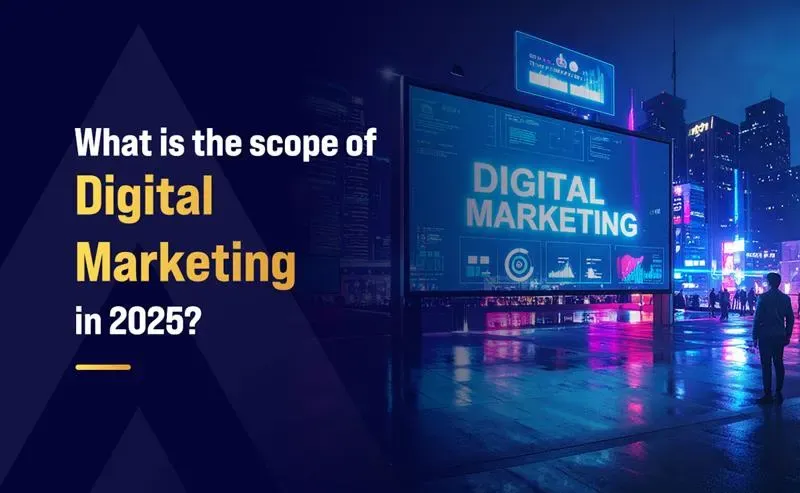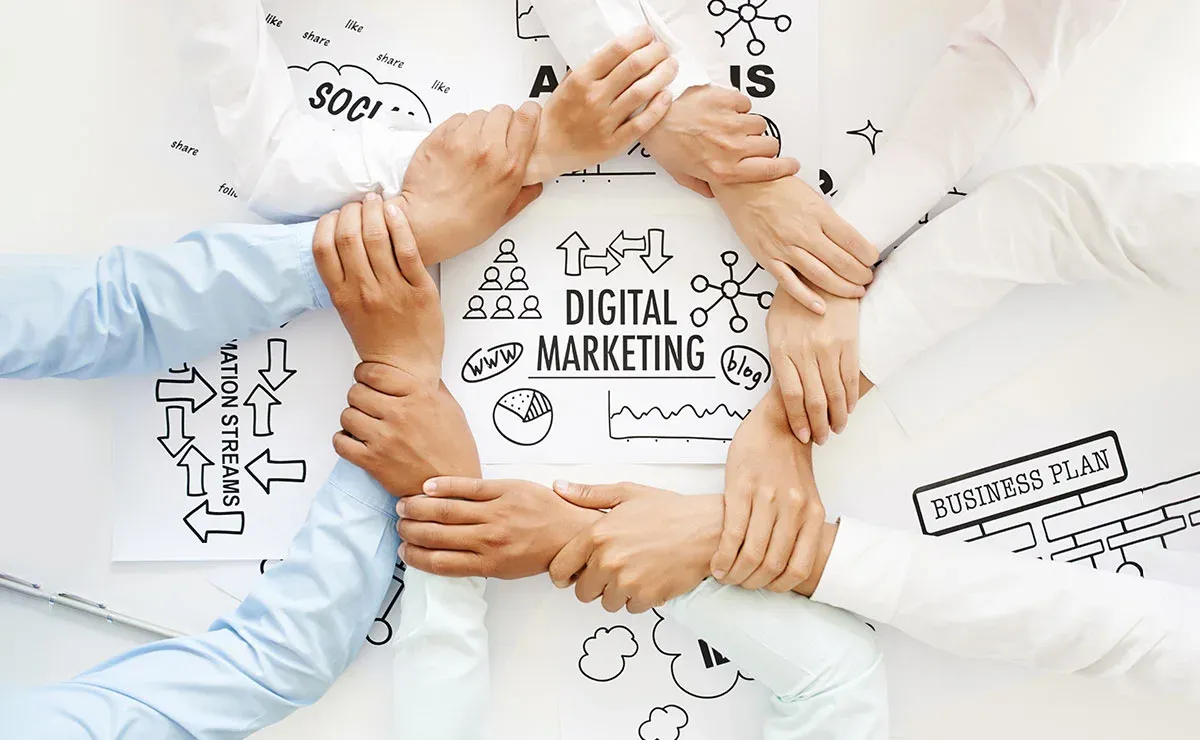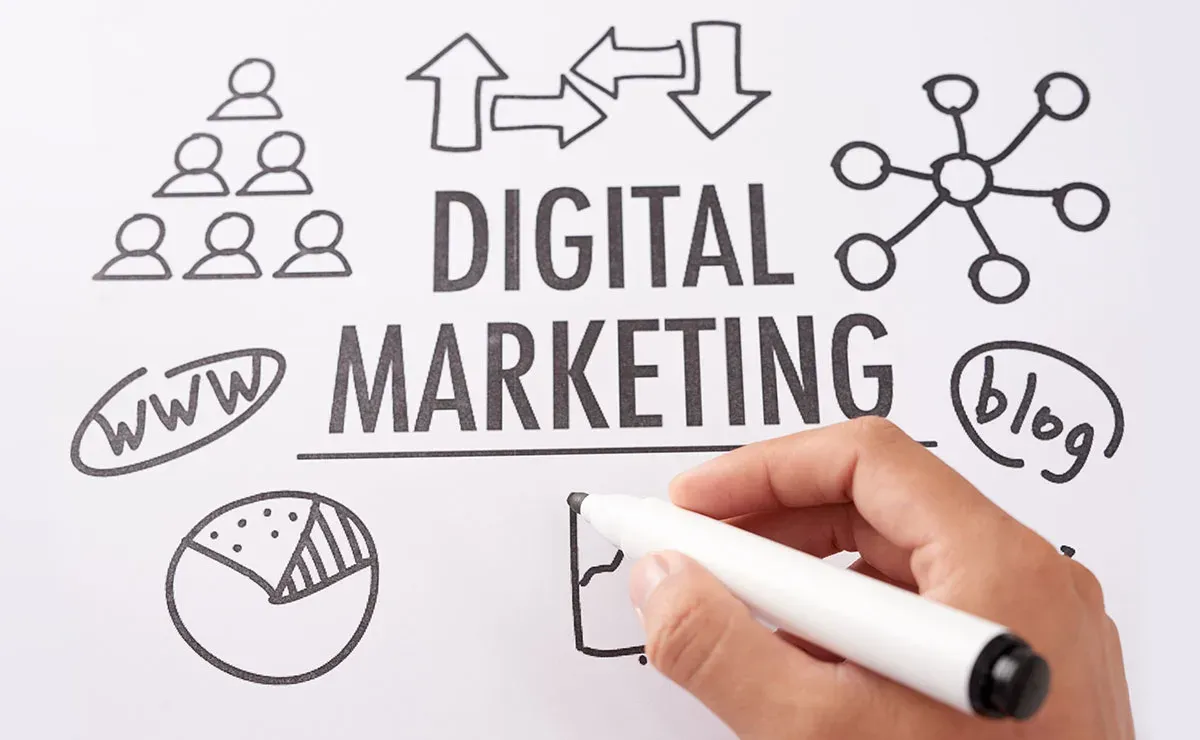What is the Scope of Digital Marketing in 2025?

The internet and digital-first technologies are essential components of modern businesses. They are transforming how information is distributed and consumed in the modern day. This shift to exist and operate online is crucial and unavoidable for competing in the market.
This is due to changing consumer patterns and an increasing internet user population. Furthermore, increased smartphone adoption and supportive government measures are also driving this transition.
This shift highlights the increasing significance of digital marketing, encompassing areas such as social media management, content creation, search engine optimization (SEO), and pay-per-click (PPC) advertising.
Digital marketing in 2025 is set to grow even further, driven by a stronger focus on analytics, smarter automation, and highly tailored customer journeys. The PGP in Marketing at Altera Institute helps learners understand these trends through practical projects and industry-focused training. If you're exploring career opportunities in this evolving field, you can check out our PGP program in Marketing to see how it prepares you for the skills in demand.
This article will go over the key growth aspects of digital marketing. It will highlight the reasons why businesses should use it, as well as the future scope of digital marketing.
Why Do Companies Use Digital Marketing?
Businesses in every industry now rely on digital marketing as a fundamental strategy of promotions. The COVID-19 pandemic has further pushed businesses of all sizes to leverage digital strategies. It helps brands adapt to modern consumer behavior, with rising smartphone usage and online sales. The main benefits of digital marketing include:

Ease of Audience Targeting:
Digital marketing allows companies to target specific demographics and markets. It uses data to increase the effectiveness of campaigns and offers brands the ability to reach global audiences.
According to Statista, there are approximately 5.16 billion internet users worldwide as of 2023, representing 64.4% of the global population.
Cost-Effectiveness:
Digital marketing campaigns are less expensive and more efficient than traditional marketing. Pay-per-click (PPC) and social media ads are examples of strategies that offer lower costs and higher returns.
According to a HubSpot report, 66% of marketers prioritize improving SEO and increasing their organic presence. It is thus the most effective way to increase their marketing ROI.
Ability to target mobile users:
Mobile devices are one of the primary mediums for internet access. Billions of mobile devices globally mean unprecedented access to potential customers. All they need to do is optimize their marketing strategies for mobile users.
As per a report, mobile devices accounted for 63.38% of all website visits as of September 2024. Therefore, brands should optimize their digital marketing efforts for mobile devices.
Real-Time Performance Analysis:
Digital marketing tools provide real-time insights into campaign performance, allowing companies to track click-through rates, conversion rates, and engagement levels.
These metrics are extremely crucial to optimizing digital marketing campaigns for businesses. A report by McKinsey & Company states that data-driven marketing boosts sales by up to 20%.
Better Engagement Rate:
Social media platforms foster a two-way communication channel. Users get to engage with the brand and post their queries, feedback, and grievances. Brands in turn use these inputs to optimize their products and strategies and engage with them to keep them interested.
A survey by Sprout Social found 70% of consumers prefer personalized brand responses.

Accessibility and Availability:
Digital marketing allows brands to engage with their customers anytime and from anywhere. It is above the complexities of traditional marketing, which operates within specific timeframes.
Digital platforms enable continuous interaction, driving leads and conversions round the clock. According to Statista, search advertising with a market volume of US$1.9bn is the largest market as of 2024.
Increased brand loyalty:
Businesses can nurture relationships with customers better through digital channels and platforms. They can optimize consumer pathways for conversions and build personal connections that last.
It also enhances a brand’s ability to analyze performance, adjust strategies, drive growth and gain loyal customers. In India, building personal connection is the driving force behind 74% of consumer loyalty.
Growth Drivers of Digital Marketing
India, with a population of 1.4 billion, is a growing market of active internet users (currently over 900 million).
According to a Dentsu report, India's digital marketing is growing 23.49% annually. By the end of 2025, its market size is projected to reach INR 62,045 crore. Let’s look at a few factors driving this growth of digital marketing in India:

- Increased Internet Penetration: India’s internet penetration rate stood at 52.4% of the total population in 2024. Globally, India ranks second in terms of active internet users. Consequently, an individual uses an average of 14.1 GB of data monthly. Companies like Reliance Jio have allowed millions of Indians to come online.
- Rise in Online Shopping and Research: Livemint reports that nearly 66% of Indians research products online for better deals before buying. This e-commerce trend has forced businesses to focus on digital marketing. Hence, it makes robust digital strategies extremely essential for modern businesses.
- Government Initiatives: The Digital India initiative is promoting the use of online commerce among the population. Economists predict this could boost India's GDP by $1 trillion by 2025. This means more jobs, higher productivity, and a bigger digital economy.
Scope of digital marketing
Digital marketing has a very promising outlook. Subsequently, several trends will continue to dominate the industry in the future.
B2B (business-to-business) Digital Marketing:
The scope of digital marketing in B2B industries is rapidly expanding as it allows engagement with their target audiences easily. According to a Demand Gen Report study, 86% of B2B marketers are now utilizing personalized interaction strategies.
This is in response to moving away from generalized mass marketing. The use of automation platforms and account-based marketing (ABM) further enhances the effectiveness of B2B campaigns through digital marketing.
B2C (business-to-consumer) Digital Marketing:
B2C digital marketing is highly competitive. It aims to engage customers, promote brand awareness, and drive direct sales. B2C marketing relies heavily on emotional appeal, visual content, and impulse-driven strategies.
India boasted the third-largest online shopper base globally, according to IBEF. There are 225 million shoppers as of 2023. Projections indicate that the Indian e-retail sector will surpass 300-350 million shoppers within the next five years. This highlights the growing role of digital channels in driving e-commerce sales.
Artificial Intelligence (AI):
AI is influencing the way businesses analyze data and target customers. With AI-powered tools, companies can now track user behavior. It can further predict preferences and deliver personalized content to individual users.
AI-driven chatbots are another key tool for enhancing customer support. It tailors the shopping experience for consumers and handles routine tasks through automation. This way, professionals can dedicate their attention to higher-priority responsibilities. AI marketing revenue will hit $36 billion in 2024, according to Statista.
Analytics and data-driven marketing:
Businesses use digital marketing to provide tailored consumer experiences via data analytics and targeted advertising. It allows real-time tracking of campaign metrics.
Google Analytics, HubSpot, and WordPress are some popular CRM systems and marketing tools. According to Mckinsey & Company, data-driven initiatives boost core product sales by over 10%.
Search Engine Optimization (SEO):
SEO optimizes websites with relevant keywords and ensures high-quality content to boost organic traffic. It helps companies improve the user experience and align content with search intent.
The emergence of voice search and mobile-first indexing is expanding the realm of organic search, prompting businesses to adopt more sophisticated marketing strategies. HubSpot reports 60% of marketers find inbound marketing as their top source of securing quality leads.
Omnichannel Marketing:
Omnichannel marketing ensures that all channels, websites, social media, mobile apps, and physical stores work cohesively. This approach is necessary to deliver consistent messaging and branding. This enables customers to navigate effortlessly between various channels during their purchasing process.
For instance, a customer may find a product via social media. They will then conduct research on their website.
Finally, they will decide to complete their transaction in a physical store. This exemplifies a unified experience. Google reports that omnichannel methods increase store visits by 80%.
Augmented reality (AR), Virtual Reality (VR), and Blockchain:
AR and VR are transforming customer experiences and providing interactive ways to engage clients. This includes immersive product demos and virtual try-ons. According to Statista, India's AR/VR industry is estimated to reach US$1,256 million by 2029.
Similarly, blockchain technology is being explored for its potential to improve data privacy. It also helps enhance transparency in digital advertising. These emerging technologies are increasingly becoming mainstream. Hence, it will significantly impact the scope of digital marketing.
Podcasts:
Podcasts are a fairly recent addition to the types of digital marketing. It is where marketers connect with their audiences via long-form, engaging audio content. This is an increasingly popular content format. It promotes brand exposure, thought leadership, and consumer education.
According to Digital Web Solutions, the global podcast market reaches $30 billion in 2024. As more organizations include podcasts into their digital marketing strategies, the scope will expand in specialist industries and for personal branding.
Altera Institute's PGP in Applied Marketing
It's clear that the world of marketing is drastically changing. It is shifting into a fast-evolving field driven by digital-first strategies and technologies. Subsequently, specialized roles in product management, growth marketing, and eCommerce are also in high demand.
Unfortunately, the academic system, particularly management education, is failing to match the increasing demand for such positions.
This is why the Altera Institute of Management (AIM) by Digiaccel was created by ex-HUL leaders as a new-age industry-backed B-school to solve for the talent gap for digital-first careers.
The Altera Institute's flagship PGP (Post Graduate Programs) in Applied Marketing course equips students with relevant industry skills and knowledge required for high-growth digital-first careers.
Why choose the Altera Institute?
- Industry-Designed Curriculum: Its curriculum is exclusively designed by industry experts from leading organizations like HUL, Amazon, Bain & Co., Goldman Sachs, and many more. This ensures that students directly learn from professionals with over a decade of experience. They hail from domains like brand building, product management, and other roles in marketing.
- Application-Oriented Learning: The program emphasizes practical application over theoretical learning. Students actively engage in live projects, assessments, and hands-on experiences with industry leaders and founders in the consumer, eCommerce, and technology sectors.
- Industry-Led Education: Classes at Altera are 100% taught by industry mentors who bring real-world expertise to the classroom. Such professionals have led successful businesses and products of their own. This improves the overall quality of education provided to students.
The Altera Institute is committed to bridge the talent gap in the digital-specific roles prevalent today. Students spend a year on campus, followed by three months of internships and job placements at prestigious companies. This aims to shape the next generation of business professionals poised for success.
FAQs
Q1: Is digital marketing a good career?
Ans: Yes, with its growing demand across industries, digital marketing presents a lucrative and diverse career path. The field offers opportunities in SEO, content marketing, social media management, and much more, offering the perfect opportunity to think strategically and work with technology.
Q2: What is the scope of digital marketing in India?
Ans: The digital marketing sector in India is predicted to grow to Rs 62,045 crore by 2025. Businesses are incorporating robust digital marketing methods into their advertising campaigns.
It also provides attractive job prospects in sectors like e-commerce, startups, and digital-first organizations. Businesses are increasingly emphasizing SEO, social media, content, and performance marketing. As a result, the country's digital marketing industry is poised to grow.
Q3: What is SEO in digital marketing?
Ans: SEO (Search Engine Optimization) in digital marketing involves optimizing websites to rank higher in search engine results. It increases the overall visibility and organic traffic of a website.
SEO enhances content, website structure, and backlinks to match search engine algorithms. It helps businesses target their audience easily. Furthermore, it helps drive organic growth and enhance their ROI.
Summing Up
The vast applications of digital marketing and its impact on modern-day business are well evident. Digital marketing jobs are growing and becoming some of the highest paid positions across industries.
From SEO and omnichannel strategies to AI-driven marketing, it offers a wide range of opportunities. Both businesses and professionals can leverage these to grow and thrive.
Hence, for aspiring marketers looking to capitalize on these opportunities, the Altera Institute of Management's PGP in Applied Marketing might just be the right choice. Visit our website and take your first step toward a thriving career in digital marketing.





